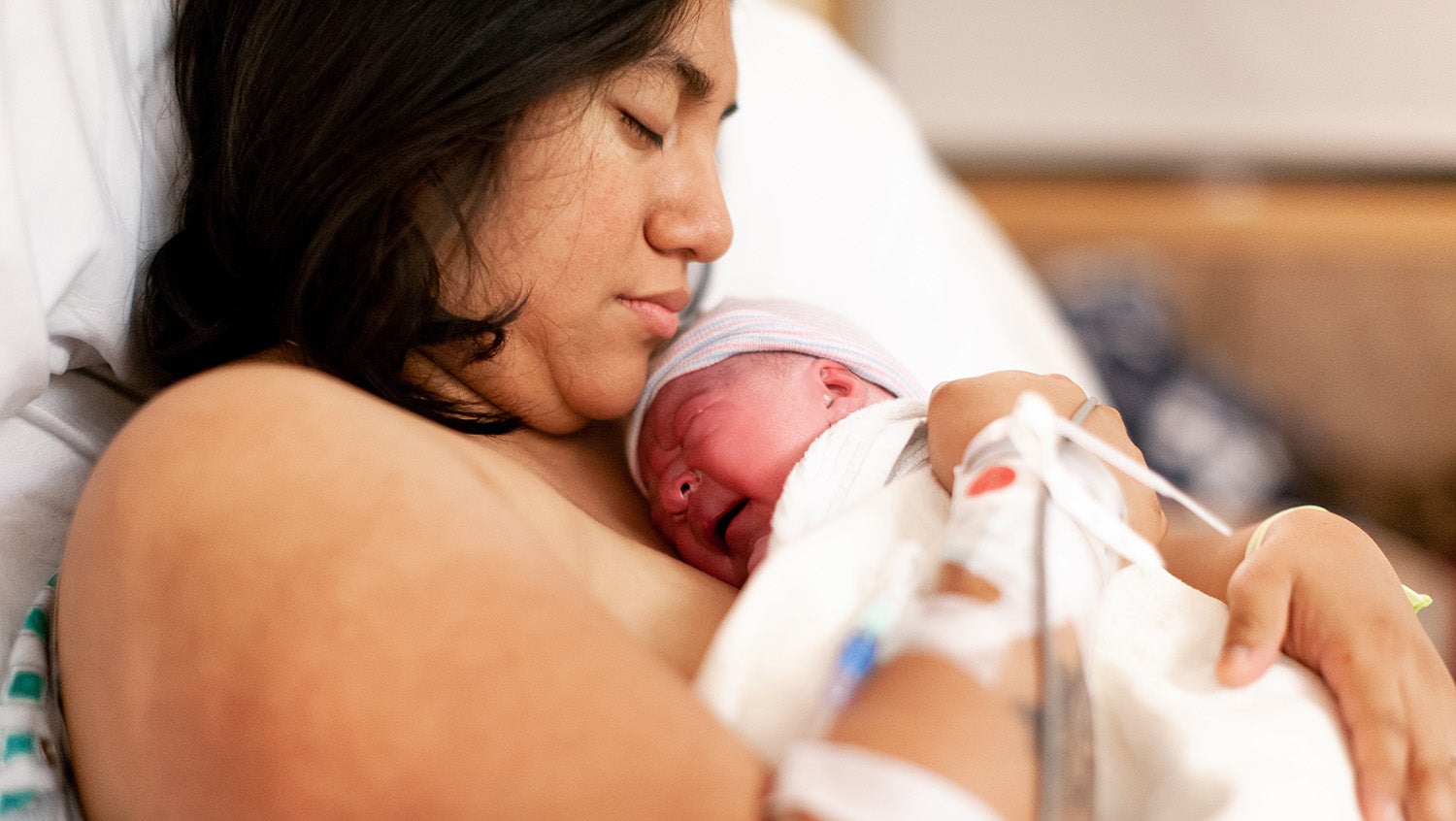Mandatory Reporting Law Is Harmful for Pregnant People with Substance Use Disorder
June 28, 2021

Getty Images
BMC experts testified in support of eliminating the requirement to report abuse and neglect for babies born with neonatal opioid withdrawal syndrome.
Currently, under Massachusetts law, healthcare providers are mandated to report a person to the Department of Children & Families (DCF) for suspected abuse or neglect when they give birth to a baby who was exposed to substances designated as “addictive drugs” prenatally. However, included in this list of substances are methadone, buprenorphine—which are FDA-approved and commonly prescribed in the treatment of opioid use disorder (OUD). Which means that healthcare providers are required to report pregnant mothers who are actively participating in evidence-based, physician-recommended treatment for OUD for abuse and neglect.
A new bill in Massachusetts legislature, H.221, An Act to Support Families, would eliminate the mandatory requirement to report abuse and neglect to DCF, with proponents asserting that the practice is harmful to both the person giving birth as well as the infant. Experts and physicians from across Boston Medical Center—including members of the Grayken Center for Addiction, the Department of Pediatrics Child Protection Team (CPT), SOFAR, Project RESPECT, and CATALYST—with the support of the Government Affairs office, presented a unified message to the Joint Committee on Children, Families, and Persons with Disabilities in support of H.221 and eliminating this requirement. The hearing took place on June 15.
“Due to the existing 51A reporting requirement, pregnant persons who use drugs are desperate for help and terrified to ask; they fear judgment, punishment, and loss of child custody,” reads a letter to the joint committee, written and signed by Miriam Komaromy, MD, FACP, DFASAM, medical director of the Grayken Center for Addiction; Kelley Saia, MD, medical director of Project RESPECT; Miriam Harris, MD, a primary care provider in the Women’s Health Unit; and Sarah Bagley, MD, the medical director of CATALYST.
An additional letter, signed by Elizabeth Egan, LICSW, MPH, social work co-coordinator of the CPT; Genevieve Preer, MD, medical co-coordinator of the CPT; Eileen Costello, MD, medical director of SOFAR; and Jill Baker, LICSW, a social worker in SOFAR, echoed the sentiment of concern for pregnant women under this existing law.
“The law as it currently stands allows for this harmful practice of filing that has led some parents that we care for at BMC to plan to discontinue essential treatment with methadone or buprenorphine in order to avoid a report being filed at delivery,” they wrote. “Clearly this is an outcome that is at odds with best medical practice; it also jeopardizes the well-being of the fetus and perversely incentivizes discontinuation of needed medical care in the service of a law that no longer meets the moment.”
The problem of relying on neonatal opioid withdrawal syndrome for DCF reporting
At the crux of the issue for the current law is the presence of neonatal opioid withdrawal syndrome, or NOWS, in the newborn baby. According to the CDC, these signs of NOWS typically begin within 72 hours after the birth and can include trembling, irritability, poor feeding/sucking, sleep problems, hyperactive reflexes, seizures, yawning, vomiting, loose stools, and dehydration—but the extent of the symptoms and the severity vary greatly.
Medications for opioid use disorder, including buprenorphine, naltrexone, and methadone, may result in a transient syndrome of withdrawal in the newborn, Komaromy, Saia, Harris, and Bagley wrote in their letter. However, they note, NOWS is temporary, easily treated, and expected, so the delivery team can prepare for the symptoms.
Elisha Wachman, MD, is an attending neonatologist at BMC and on the faculty of the Grayken Center for Addiction. As a pediatrician, she painted a picture of what NOWS looks like.
“NOWS is a treatable and transient condition which does not require any intensive care. Infants room-in with their mothers, receive supportive care, including breastfeeding and skin-to-skin contact,” Wachman wrote. “Medication such as low doses of methadone are used 30-40% of the time, usually only 1-2 doses in total, and the average length of hospitalization is now 10-11 days since implementing this family centered approach.”
On the other hand, if mothers are not treated with medications for OUD (MOUD) and instead continue to use unprescribed substances, Wachman noted that they are at high risk for preterm birth and fetal growth restriction, as well as adverse maternal outcomes. MOUD reduce the risk of overdose mortality by nearly 70%, and yet, all of the testifying BMC experts agree that fear of having their children taken away can lead to pregnant persons discontinuing this effective treatment during pregnancy.
H.221 would allow a 51A to be filed only if there are additional child protective concerns, not solely due to the diagnosis of NOWS, and maternal stability would be taken into account, rather than automatic reporting of abuse and neglect.
“I have seen mothers in recovery for 10 years, peer recovery coaches, who remain on treatment with methadone or buprenorphine who have to undergo a stressful DCF evaluation after delivery,” wrote Wachman.
Sickle cell disease care and prescribed opioid medications
Experts from the Child Protection Team at BMC illuminated in their letter how reporting mechanisms and individual decisions to report child abuse and neglect are often impacted by racism, bias, and structural inequities. And while that persists for pregnant people on medication-assisted treatment for SUD, the mandatory reporting clause also affects other populations of people who are prescribed opioids.
Sickle cell disease (SCD) affects approximately 100,000 people in the U.S., and it disproportionally impacts Black Americans. According to the CDC, sickle cell disease occurs in 1 out of 365 births of Black babies—compared to, for example, 1 out of every 16,300 Hispanic-American births. People with SCD experience acute and chronic pain, and these severe pain symptoms often require management with prescribed opioid medications.
As a result, for people who give birth under needed pain medication treatment for sickle cell disease, it would not be unusual for their infants to experience NOWS. Egan, Preer, Costello, and Baker emphasize in their letter the harmful consequences for pregnant people with SCD, who are primarily Black, under the law as it’s written.
“Under the current interpretation of the law, however, a report could be filed even when NOWS is the result of pain medications prescribed by the medical team to a pregnant person with a severe, hereditary disease without alternate treatment options, and in the absence of any identified protective concerns,” they wrote.
The Plan of Safe Care tool for pregnant people with SUD
All of the BMC experts advocating for bill H.221, eliminating of the mandatory reporting clause of the law, agree that the removal will allow pregnant people to access optimal prenatal medical treatment, which will ideally ensure the best possible birth outcomes.
Members of the Grayken Center for Addiction and Project RESPECT instead support what they define as a more effective tool, the Plan of Safe Care mandate. Plan of Safe Care (POSC) is a document created and shared by a pregnant person and their providers to plan for services and supports, including, for example, recovery services, mental health support, prenatal care appointments, and child services. Komaromy, Saia, Harris, and Bagley wrote that a POSC mandate will help form more beneficial connections between pregnant people or parents and newborns in need with services, including the DCF as necessary.
“Instead of requiring providers to file 51A reports for all substance-exposed newborns, the current Plan of Safe Care mandate, required for all pregnant persons with SUD, is a more effective tool to assess child protective concerns and provide a structure to identify families who will benefit from DCF services,” they wrote.


